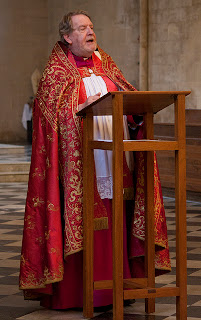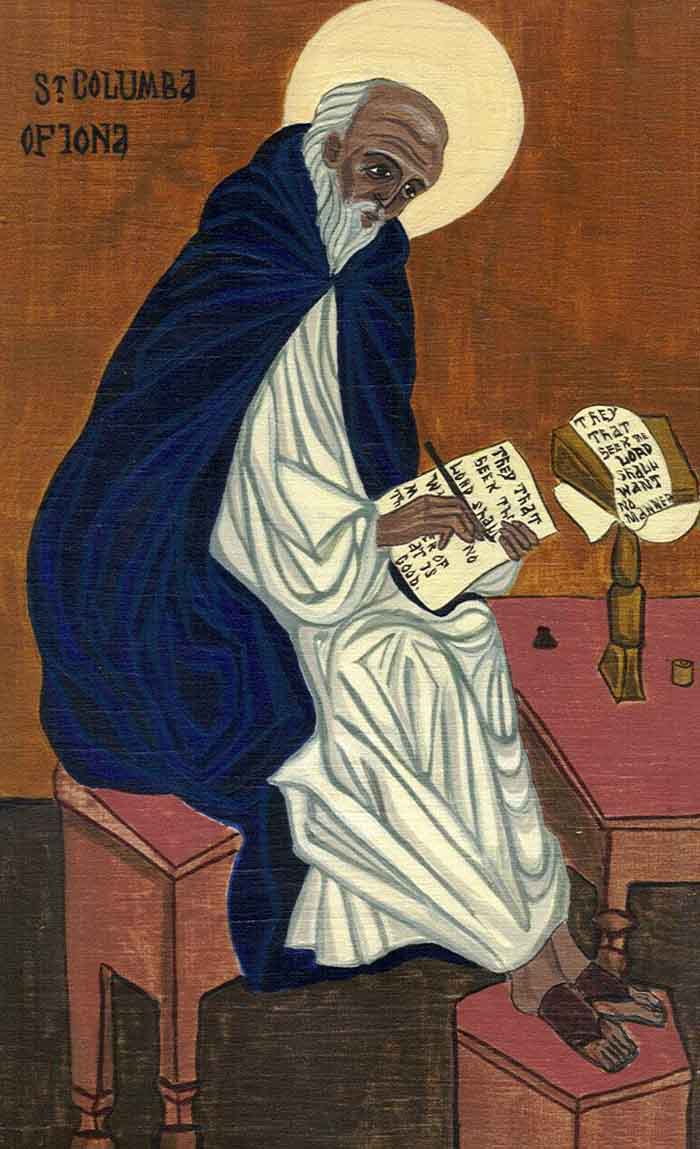.
This sermon was given by Monsignor Andrew Burnham at Solemn Evensong & Benediction in the Priory Church of the Holy Spirit – Blackfriars, Oxford, on Wednesday 15 June 2011:
You are a kingdom of priests and a holy nation Exodus 19:6
This is how the Lord speaks of the Israelites as they reach Mount Sinai, ‘a kingdom of priests and a holy nation’. They are ‘encamped before the mountain’, on their journey from Egypt to the Promised Land, and they are about to witness a theophany. The Lord himself will descend upon Sinai, in the sight of the people. It will be a dreadful sight – or, as the Americans are trying to encourage us to say, even liturgically, it promises to be ‘awesome’. No one should touch the mountain until they are brought up to meet God. And the penalty is stoning. Israel – this kingdom of priests, this holy nation – is about to receive the Ten Commandments and the whole ceremonial apparatus of the Law.
We might profitably dwell on the way that theophany – God’s revelation of himself – precedes the giving of the moral Law. We might profitably dwell, too, on the way that the moral Law – the commandments to honour and love God and the commandments to love and honour our neighbour – leads straight into the detailed prescription for the worship of God. Catholics, at least, need have no fear of the way the liturgy and the lives we are called to lead complement and flow into one another. Why else does the pedagogy of the public Office, however doxological the readings, flow into eucharistic devotion? Why else does our eucharistic devotion flow out with us into the world in which we are called to work as business folk, carers, healers, parents, teachers, and the rest?
 |
| Photo by Br Lawrence Lew OP |
In some ways ‘kingdom of priests’ has a sad history. The burgeoning individualism following the humanism of the Renaissance encouraged folk to believe in a new democratic priesthood of all believers. Broadly, according to this view, a particular reading of the Letter to the Hebrews, the Sacrifice of Christ put an end to cult and sacrifice. The new priesthood, exercised by every believer, fed on the study of the word, and depended on learning, with the intellect, the importance of the Christian virtues. Thus whoever pored over his Bible, though ‘he digge or delve’, as Erasmus said, could learn what he needed to learn, find out how he needed to live, an enterprise in which the support of other believers was highly desirable, but as individualism worked its way inexorably, could hardly be said to be indispensible.
Needless to say phrases like ‘a kingdom of priests’ and even ‘the priesthood of all believers’ are not to say that every believer, every subject, is a priest. Still less is it to say that the New Covenant has no need of a ministerial priesthood, those who celebrate the cult. Anglican patrimony, at its best, preserves the nuance of ‘a kingdom of priests’ without denying the priestly ministry of the ordained – which is neither to assert nor deny the sacramental validity which is claimed.
Those of us who have already become Catholics, under the ægis of Anglicanorum cœtibus, have recognised, and are attempting to be agents of healing of, the undoubted rupture and discontinuity to be found in the history of the theological idea of ‘a kingdom of priests’. We bring along to the Catholic Church some great shards of the precious vase which is English Catholicism. One such shard, undoubtedly, is the public celebration of Evensong, which, whatever the bloggers may say, is the mediæval name for Vespers, albeit combined by Cranmer with the office of Compline, giving us the twin climaxes of two Gospel canticles, Magnificat and Nunc Dimittis. .It is possible to claim too much for the Anglican inheritance but the public reading, day by day, of the Bible in the tongue of the people is now recognised, almost universally, to be what 1066 and all that would call ‘a good thing’. In that sense the kingdom of priests is equipped for its work. Another shard is the musical tradition which, rather like a worm cut in two – I hope I am getting my zoology right – results in two independent worms. Anglicanism lost, at least for a few centuries, the glory of Taverner, Tye, and much of Tallis. But the newly growing organism, enriching the English soil immeasurably, gave us Gibbons and Purcell, Wesley and Stanford.
But, to return to the main theme, a proper understanding of ‘a kingdom of priests and a holy nation’ is possible only within the particular Israelite Covenant context or, within the New Covenant, in the Catholic doctrine of the Church. Only in the Catholic doctrine of the Church is the Holy Eucharist, the Eucharist offered within the Sacrifice of the Mass, and as worshipped in Benediction, inevitably and indubitably the focus of our devotion. Only within the Catholic doctrine of the Church is a eucharistic people fully and indubitably empowered to embark on living out the Covenant as handed down on Sinai and expounded at the Sermon on the Mount. The kingdom of priests is not a bunch of priests, still less a bunch of lay folk who have no need of a ministerial priesthood, but a holy people, chosen to ‘declare the wonderful deeds of him who called you out of darkness into his marvellous light’. This holy people, as prophetically recognised by Anglicanorum cœtibus, is enriched – ever so slightly, for there are not many of us and may never be many of us – by the liturgical forms and musical expressions that have developed their own life within Anglicanism and which, whenever they speak of continuity and not rupture, are now usefully and beautifully restored to their ancient roots. There is very little we newcomers can teach our fellow Catholics about social action and living as the Christian community in the world. I have been amazed not only by the warmth of the welcome we almost inevitably receive but also by the depth with which the Catholic laity have penetrated society. Wherever there is caring, healing, teaching – to name some of the more obvious contexts – you find Catholics in there with others, and doing it. I am also sadly aware of how often some of these Catholics have become estranged from the Church and the Eucharist and, uttering the ritual shibboleth of ‘Catholic guilt’, almost work harder to do their bit in the secular world. The call for all of us – and this is where Anglican patrimony might help a little – is to recover the beauty of holiness, and the mystery of the Eucharist, and its truly sacrificial character, and its joyful proclamation of the Risen and Ascended Lord in our midst. If we recover that, then the Covenant connections between theophany, love of God, love of neighbour, and liturgical celebration will commend themselves not only once more, we pray, to lapsed Catholics but to souls which are ‘athirst for God, yea even for the living God’ (Ps 42:2).
+Laus Deo!
















